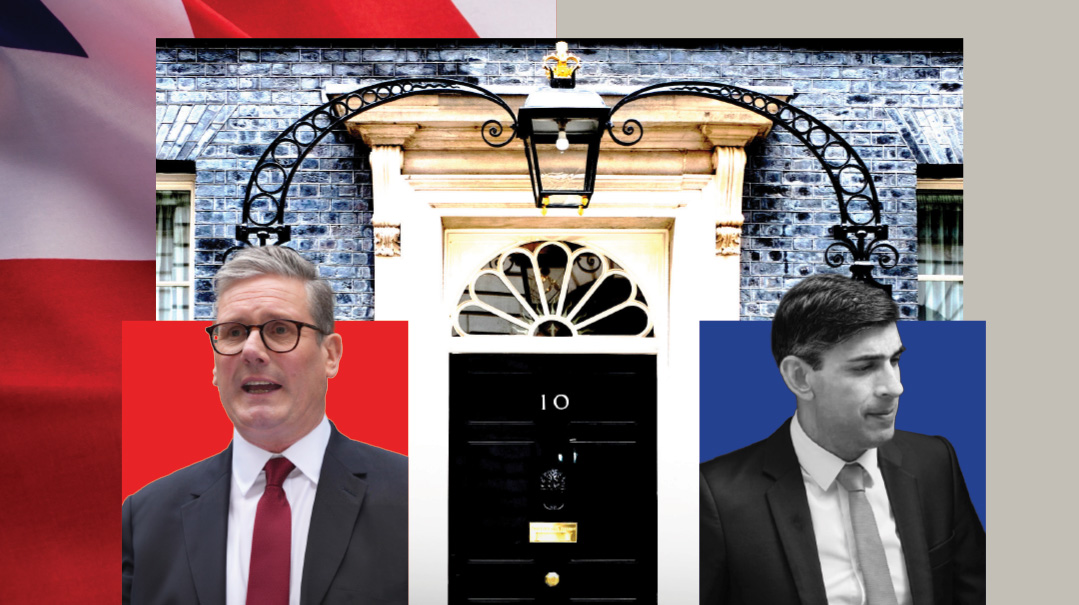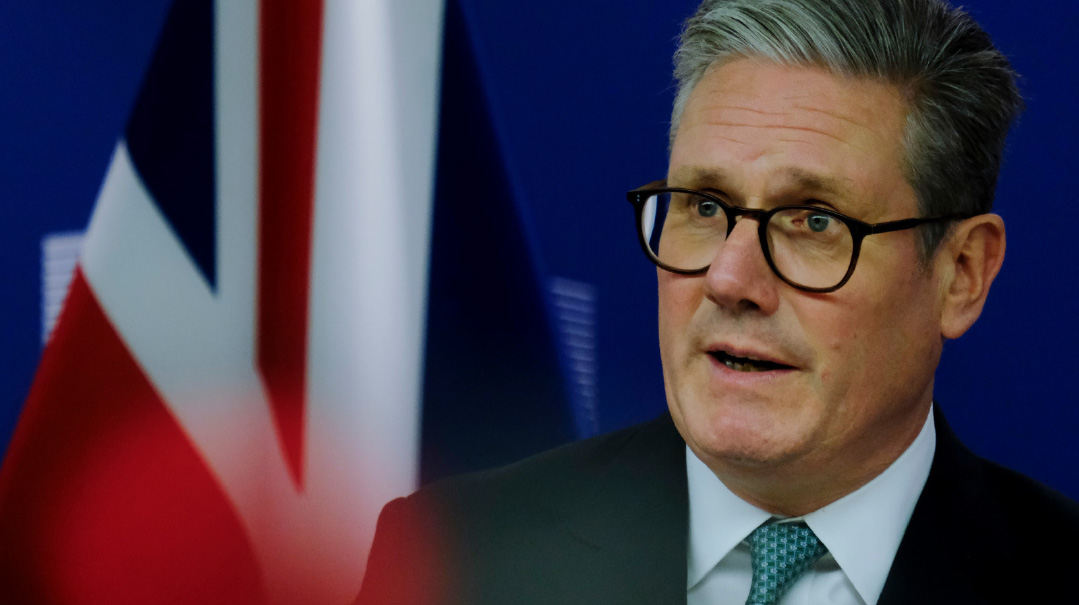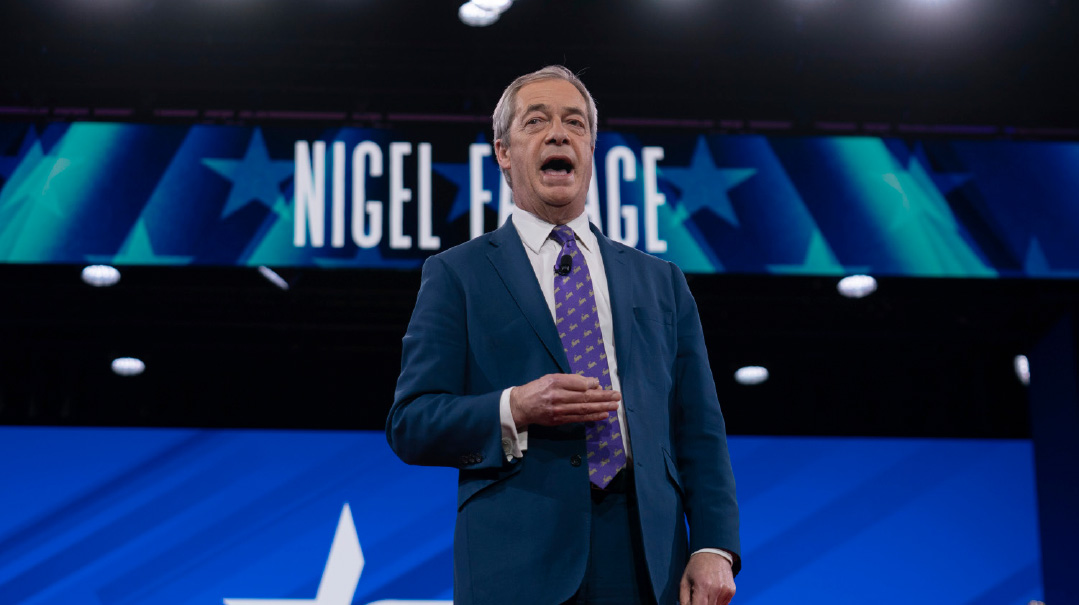An Underwhelming Landslide
| July 9, 2024Closer analysis of the United Kingdom’s 2024 general election results raises the question: Earthquake or illusion?

The headlines and the colored maps showed Keir Starmer’s Labour Party winning the United Kingdom’s 2024 general election in a landslide. But closer analysis of the results raises the question: Was it an earthquake, or an illusion?
“A new yawn has broken, has it not?” was Politico’s pithy if unkind summary of this Labour victory — a play on Tony Blair’s triumphant rallying cry, “A new dawn has broken, has it not?” when he swept to power in 1997 on a wave of optimism.
Veteran pollster Peter Kellner told Times Radio that this was one of the weirdest he’s covered in over five decades. Labour leader Keir Starmer won a huge majority on the lowest share of the vote and the lowest approval ratings for any victorious prime minister. A weary public looking for stability, change, and psychodrama-free government gave the Tories their worst kicking in history and Labour their second-largest postwar majority.
But beyond the headline stories of Labour victory and Conservative Armageddon, the tectonic plates are shifting yet again, revealing some surprising trends. The two stories of a dramatic night, and what might come next.
Conservative Carnage
It was an unprecedentedly bad night for the Conservatives, who had their worst result since the modern democratic system was established in 1832. They were reduced to a rump of just 121 — a third of their 2019 romp of 365, while Labour rode to victory with 412 seats, more than double the 203 of their 2019 doldrums.
The Liberal Democrats took scores of seats off the Tories, bagging their best-ever result of 72, up 61 from their 2019 count. They campaigned strongly on local issues like water pollution and social care provision in areas with high elderly populations, but their unique selling point was being the best-placed party across the South to topple Conservative candidates.
Reform UK, which Nigel Farage has only led since 2021, took five Tory-held seats. Even the far-left Greens took two rural Conservative seats, campaigning there on environmental issues like water pollution, rather than on the pro-Palestinian conflict (which did win them an additional urban Labour-held seat).
But ultimately, it was Reform who cost the Conservatives the most seats by splitting the right-wing vote. While the Tory vote share dropped 19.9%, Labour’s only rose 1.6%, and Reform were the biggest beneficiaries, increasing by 12.3%.
Senior Scalps
No fewer than 11 serving Conservative cabinet ministers lost their seats, many of whom had majorities over 10,000. They included leadership hopefuls like House of Commons leader Penny Mordaunt, Education Secretary Gillian Keegan, Defense Secretary Grant Shapps, and Science Secretary Michelle Donelan. Countless prominent backbenchers and former ministers lost their seats, too.
But the biggest shock of the night was the defeat of Liz Truss, whose Labour opponent overturned her majority of over 26,000 and squeaked over the line by 630 votes. It’s a final humiliation for the former prime minister, whose brief, chaotic premiership cost the Tories the election, according to Daniel Finkelstein, a former advisor to Conservative leaders.
“I believe if she hadn’t been prime minister, the Conservative position would have been vastly stronger, and it would have been at least contestable for the Tories to be the largest party,” Finkelstein told Mishpacha.
Truss has been famously uncontrite over her shambolic tenure, blaming her government’s failure on “the deep state.” Perhaps her inability to hold on to her own seat — previously the 11th safest in the country — will give her food for thought about what went wrong.
Where Next?
While it’s undoubtedly a crushing defeat, the Conservative seat count of 121 was higher than some of the more dire polls that predicted the Tories would only hold around 60 seats. Former Conservative leader William Hague, who led the Tories after their 1997 battering, has said it’s possible to rebuild from a triple-digit base, and if they get the right leader and mount an effective opposition, the Tories could avoid spending the next decade out of power.
“Whichever way people voted, they voted against the Conservatives, because they failed to deliver their promises,” says Finkelstein. “Parties try targeting voters like Mondeo Man [the aspirational suburbanites Blair won in 1997] or Worcester Woman [the socially liberal, economic conservatives Cameron won in 2010]. But there’s no such thing as Fiasco Father, so the Conservatives’ dismal record alienated everyone.”
With the party’s drubbing having come from so many directions, an almighty blame game and battle for its future is underway. Some hardline Tory MPs advocate a pact or merger with their populist rivals Reform, but more experienced voices are warning against a lurch to the right. Finkelstein pointed out the morning after the election that the Conservatives have won elections without the post-industrial North, where Reform made big gains, but they have never won without the prosperous South, where the Liberal Democrats decimated the Blue Wall of affluent commuter and rural seats that had been Conservative for decades.
Leadership Possibilities
Several contenders for party leader have lost their seats, and not many Conservative MPs are rushing to be opposition leader, dubbed the worst job in politics. A huge Labour majority and some eye-catching government appointments (more on that below) have rendered the diminished Conservatives utterly irrelevant as the hungry media pack focuses on the new government, and they will struggle to get any sort of message through.
But a few individuals are angling for the leadership, including former home secretary James Cleverly, who’s seen as a statesmanlike, popular, and unifying figure. Former security minister Tom Tugendhat, a centrist ex-soldier and foreign policy aficionado, has been beavering away at a potential leadership bid. So has former immigration minister Robert Jenrick, who was a Sunak ally, but quit his government last year over his dissatisfaction with Sunak’s position on immigration, which Jenrick deemed to be insufficiently hardline. Brexiteer Priti Patel, home secretary under Boris Johnson, has been keeping her head down, showing surprising loyalty to Sunak, and could run as well.
Labour Luck
It seemed impossible just two years ago that Labour would surge to such a decisive victory, but the work that Keir Starmer put into rebuilding his party, wrenching it back from the left’s stranglehold, and moving back to the center, paid off. When Starmer got lucky, and his two main rivals, the Conservatives and the Scottish National Party, imploded, voters deemed Labour safe enough to entrust with the difficult business of governing a Western multi-ethnic democracy in 2024.
But the numbers, and some surprise Labour losses, underscore what voters have been grumbling about for months now: They don’t know what Labour stands for, and they find Starmer uninspiring, but they’re fed up enough with the Tories to give the other lot a chance.
Labour’s vote share in the seats they won in 2019 actually dropped, and they achieved their historic victory on just a 1.6 percent increase on their 2019 vote share, which means their mammoth constituency gains are spread relatively thinly. A large majority based on a wide but shallow coalition will make party management difficult, and that’s even without the grim picture of stagnant growth, record-high tax burden, crumbling public services, and rising community tensions that Starmer’s inherited. Here’s what happened on election night, and what it tells us we can expect from a Labour government.
The Gaza Vote
Labour suffered some shock defeats, with five independents who ran on a pro-Palestinian ticket taking seats in Labour strongholds, including Jeremy Corbyn. Starmer ousted his predecessor from the party over Corbyn’s remorseless response to a damning report into anti-Semitism in Labour on his watch, but the socialist crank ran as an independent on his 41-year record as a local MP, and on the Gaza issue.
Loyal Starmer lieutenant and skilled political operative Jonathan Ashworth lost his seat to a pro-Gaza independent. Three more Labour seats in areas with large Muslim populations also flipped to independents, but in good news for mainstream politics, anti-Israel firebrand George Galloway lost his seat by a whisker. Health Secretary Wes Streeting, Labour’s charismatic centrist rising star, held on to his East London seat by just a few hundred votes, and the shadow Culture Secretary Thangam Debbonaire lost to the Greens on the Palestinian issue as well.
The Muslim community, 80 percent of whom voted Labour in 2019, are furious with Starmer over his support for Israel after October 7, and many Labour MPs in Muslim-dominated areas with diminished majorities are worried their alienation could cause further losses.
Labour candidates faced intimidation and harassment from Muslims and activists during the election, so we can expect significant pressure on Starmer to take a more pro-Palestinian position. He’s already committed to recognizing a Palestinian state, but only as part of a wider solution to the conflict. This may well change in the face of a backlash from a voter base Labour clearly took for granted.
The Rise of Reform
While Labour lost votes to the left, Reform are also snapping at their heels, coming second in over 100 seats. It was only due to Reform’s surge in the postindustrial North, splitting the Conservative vote, that Labour regained its former heartlands. Longtime Labour voters lent their vote to the Conservatives in 2019, and, bitterly disappointed by their self-destruction and failure to deliver, handed it instead to Reform. At his count in Clacton, which he won with almost 50 percent of the vote, a triumphant Nigel Farage declared he was now gunning for Labour.
Farage has a track record of pushing governments to act on the issues he campaigns on. He was arguably the most influential figure in Cameron’s decision to call the Brexit referendum, and really spooked Tory MPs under Rishi Sunak on immigration — all without the platform of a parliamentary seat. Now, the former stockbroker and charismatic maverick intends to use his seat, and gaggle of MPs, to be “the real opposition to Labour,” suggesting the Conservatives are not too different from Starmer’s party.
Starmer, whose plan for lowering immigration is to continue Conservative attempts to break up smuggling gangs and police the Channel more effectively, will be under pressure from these MPs to be more hawkish on immigration than his liberal instincts would allow.
Class Warfare
One of Labour’s more eye-catching and concrete policies is their pledge to levee a 20% VAT (value-added tax) on private schools and change their status from educational charities to businesses.
This would obligate schools to charge an extra 20% on fees, effectively handing over a fifth of their income to the government, and pay hundreds of thousands of pounds in property taxes, which educational charities have been exempt from. Designed to harvest funds from some of the wealthiest private schools to boost state schools, this is deeply worrying for chareidi schools, most of which are private.
Chareidi private schools can no longer become state schools, because curriculum changes in recent years require public schools to teach topics antithetical to Torah values. Unless the curriculum changes, the state sector is blocked to chareidi schools.
Motti Pinter, head of communal affairs at chareidi education advocacy bulwark Chinuch UK, told Mishpacha they’re working with senior Labour figures on solutions that wouldn’t undermine the policy but that would exempt chareidi schools from the tax.
“It’s existential,” Pinter says. “Schools barely survive already with fundraising campaigns. If they have to pay 20 percent of their income in tax, and are saddled with hundreds of thousands in property taxes, most of them will simply fold.”
Pinter is hopeful that Labour’s upper echelons will be receptive to working out some kind of compromise. “They recognize that there’s a problem with the chareidi sector,” he says, “and they’ve assured us they’ll come back to us to implement a solution before they go ahead with the policy.”
Pragmatism over Principle?
Speaking in front of 10 Downing Street, an exultant Keir Starmer promised a government of service and unity, unencumbered by dogma. But one man’s pragmatism is another man’s spinelessness.
Finkelstein personally believes governing by common sense rather than by ideology is the correct strategy for Labour, but he warns that Starmer must establish a narrative for his government, or risk being perceived as reactive, weak, and buffeted by events.
“Labour have not yet framed that narrative,” says Finkelstein, “and they’ll have to do it quickly.”
Some of Starmer’s cabinet appointments are notable for their apolitical bents. He appointed businessman James Timpson to oversee Britain’s overcrowded prisons and former Chief Scientific Advisor Patrick Vallance as a science minister.
Timpson’s chain of shoe repair stores is famous for employing ex-convicts, and he’s a vocal advocate of rehabilitation over incarceration. Timpson himself has previously said that a third of prisoners shouldn’t be in prison at all. While providing respectable employment to ex-prisoners has proven effective at preventing repeat offenses, Timpson’s stance on overall prison numbers could well alienate voters who value law and order, and will likely clash with the new home and justice secretaries’ more tough-on-crime agendas.
Vallance was chief science advisor during Covid, and worked for the Tony Blair Institute, the think tank founded by Labour’s most successful prime minister, which has deep pockets, and an open door to Starmer’s Number 10. He recently endorsed Labour’s net-zero ambitions, and Starmer hopes his expertise could harness the UK’s world-leading research and life sciences sectors to spur much-needed economic growth.
SNP Wipeout
After the 2014 independence referendum, the Scottish National Party won 56 of Scotland’s 59 parliamentary seats at the 2015 election, ending Labour’s decades-long dominance north of the border. They achieved a similarly clean sweep in 2019, taking 48 seats, leaving Labour with just one Scottish MP. Now, Labour have roared back to life in Scotland, taking 37 seats, and leaving the SNP with just nine.
Like the Conservatives, the SNP were beset by a dismal domestic record (they’ve run the devolved Scottish government since 2007), corruption scandals, and a rapid turnover of leaders. Voters were tired of hearing about independence as the cure to all ills, and returned to Labour in droves. For now, the union looks safer than it has for a decade.
Tradeoffs? No, Thanks
Voters broadly found the choice before them uninspiring, hence the surge of support for smaller parties and independents. Labour’s strategy was to stay far away from any controversial or politically unpalatable decisions, playing it safe policy-wise — and vague —to get to the finish line. Neither they nor the Tories were offering bold or deliverable solutions to the country’s deep-seated problems, and the reason for that, Finkelstein believes, is rather depressing.
“Voters are simply unwilling to accept the difficult tradeoffs that are needed,” he says. “They always say they want the politicians to tell them the truth, but they don’t, really.”
No wonder voters were unenthused by the two main parties. But perhaps they only have themselves to blame. —
(Originally featured in Mishpacha, Issue 1019)
Oops! We could not locate your form.







